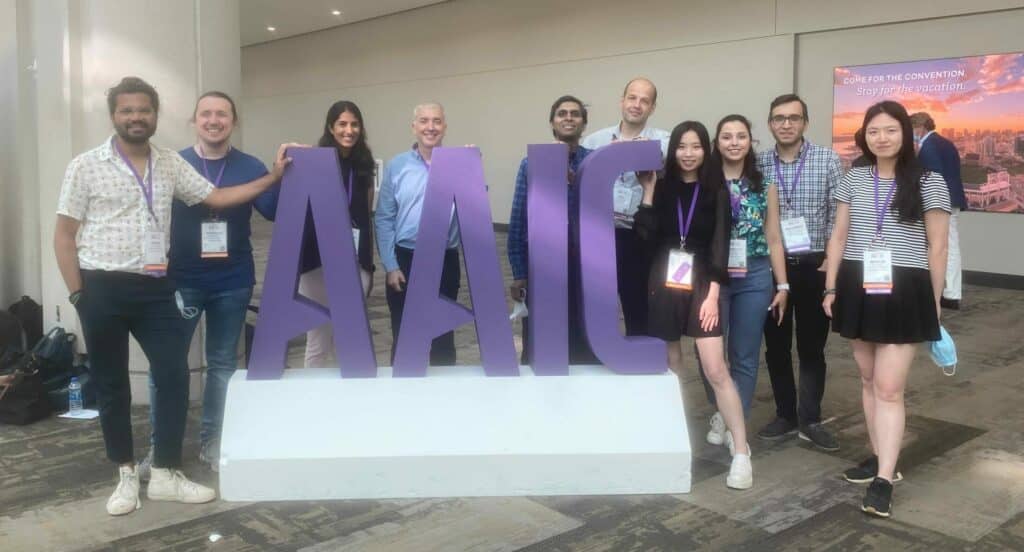By Cait Kearney and Meghan McCarthy
Editor’s Note: This article is a broad summary of research at and beyond the University of Pennsylvania. We will revisit these topics in greater depth in the coming weeks.

University of Pennsylvania researchers at AAIC 2022
Penn Memory Center scientists gathered last week with colleagues from around the world in San Diego, California, to share their pioneering research at the Alzheimer’s Association International Conference (AAIC) 2022 — the world’s largest academic conference for dementia research.
Promising advancements in Alzheimer’s diagnostics, interventions, and the understanding of the basic science of the disease were on display at this year’s conference.
“We are in a transformative time,” said Penn Memory Center (PMC) Co-director David Wolk, MD.
Conference Highlights
Experiences of racism are associated with memory and thinking issues
A large study of 1,000 adults showed that people who experienced racism were more likely to have issues recalling things that happened in their pasts. These findings were echoed in another study of 445 of people who were 90 or older. Those who faced discrimination throughout life had poorer long-term memory than those who did not.
Ultra-processed foods aren’t good for your brain
Researchers linked ultra-processed foods like sodas, breakfast cereals, and white bread to faster cognitive decline. The study followed nearly 11,000 adults for eight years. Those with high consumption of ultra-processed foods had 28% faster decline in memory and thinking abilities than those with healthier diets.
Even low exertion exercise can protect your brain cells against damage
The EXERT study closely examined the benefits of exercise for people living with mild cognitive impairment (MCI) over the course of a year. Those who regularly got their heart pumping and those who regularly stretched showed no signs of cognitive decline compared to those who did not exercise.
UPenn Highlights
Recommendations for better communicating with research participants when trials end early
In 2019, Biogen suddenly pulled the plug on two clinical trials testing the Alzheimer’s drug aducanumab. Some research participants heard the news on TV, before research teams could reach out to them. This left participants feeling confused and disappointed.
At AAIC 2022, experts including Penn’s Emily Largent, JD, PhD, RN, made recommendations on how to improve communication with and support for research participants if their study ends early. Some of these recommendations include:
- Research participants should be notified about their trial ending in a “timely, effective manner”
- Those running the trial should ensure there are enough resources to close-out the trial in an orderly fashion
- Communication plans should be centered around participants and their care partners
“Research participants and their study partners invest significant time and effort – and hope – in their research participation,” said Dr. Largent. “Respecting that investment requires that we find better ways to communicate with them and to support them when trials end early.”
A Penn cornerstone: Heterogeneity in Alzheimer’s disease
Some people may develop Alzheimer’s disease at 65 and others at 90. The disease may progress slowly for some and rapidly for others. Symptoms can vary widely.
Alzheimer’s disease has many different underlying pathologies. This variety is called heterogeneity — a primary research focus of the Alzheimer’s Disease Research Center (ADRC) at Penn.
“The Penn ADRC and larger community has made this a central focus of our research which requires the collaborative spirit and integration of neurodegenerative disease centers that is unique to Penn,” said Dr. Wolk.
Understanding these differences is vital to developing effective diagnostic tools and interventions.
“We believe that a deeper understanding of heterogeneity will not only improve diagnosis and prognostication, but will lead to tailored therapies that will enhance our success in treating these tragic conditions,” said Dr. Wolk.
The way we talk about dementia matters

Cynthia Huling Hummel, Angela Taylor, Marwan Sabbagh, and Jason Karlawish at the AAIC dementia nomenclature meeting
A team chaired by PMC Co-director Jason Karlawish, MD, convened to discuss the terms used to describe impaired cognition.
The group is working to stop the use of stigmatizing terms, such as calling someone “demented,” and on clarifying terms that are often confused with one another, like dementia, Alzheimer’s disease, and mild cognitive impairment (MCI).
Using more precise and consistent terminology may reduce stigma and common misunderstandings about Alzheimer’s disease and dementia.
“Patients, families and clinicians need words that make sense of their problems and make a plan. Researchers use them to consistently and accurately measure their data and report their results. And advocates and policy makers use them to set goals, measure progress and allocate resources,” said Dr. Karlawish.
Machine learning in Alzheimer’s diagnostics
Several Penn researchers presented their work on machine learning, or when computer programs are trained to execute tasks and can then solve problems independently. Benefits to machine learning include efficiency and accuracy.
Sandhitsu Das, PhD, is a research assistant and professor of neurology at the Perelman School of Medicine.
“In Alzheimer’s and related dementia (ADRD), various forms of machine learning are used for traditional prognostic purposes such as predicting if and when an individual is likely to progress to dementia, as well as more complex tasks in imaging, genomics, and biomarker discoveries,” said Dr. Das.
The focus of machine learning in ADRD at AAIC reflects the method’s increasing prominence within the field.
“It is not new, but has really taken off over the last decade or so,” said Dr. Das.